Barcelona. Yesterday we spent the much of our day in the beach area of the city, a neighborhood unto itself, Barcoloneta. There the sense of living by the sea infects even the inner neighborhood, removed from the flow of tourists and natives of the city making merry on the beaches. The residents seem to know they are breathing sea air, that the blue of the Mediterranean is just a few blocks on the other side of the high rises.
From the Metro station, we strolled down the wide, palm-lined avenue, with all its tempting restaurants offering fish, tapas and paella, down to the harbor we’d seen the evening before, to the wide, stone-paved parks with magnificent views of the ocean, the cable car up to the nearby hill and the luxury hotels. There next to the beaches people strolled along with us or sat in the shade where tall trees with ferny leaves were dropping their golden-orange flowers to lie like pools of light on the patterned stones.
Then onto one of the wide-spreading beaches, set off from one another by stone breakwaters. The water was astonishingly clear, closer to the color of the water of the Atlantic on the Algarve than to the waters of the posh beaches of the Costa del Sol. The water was so tempting and the atmosphere so free that I took off my shirt and pants and went in for a long and beautiful swim in the calmly lapping waves in my black bra and panties. No one even gave me a sideways glance. We sunned and slept for awhile and bought a watery Mojito and a beer from the beach hawkers in tribute to my son-in-law and daughter, who before they were married, spent a summer hawking coffee and pastries on the beaches of Montpellier.
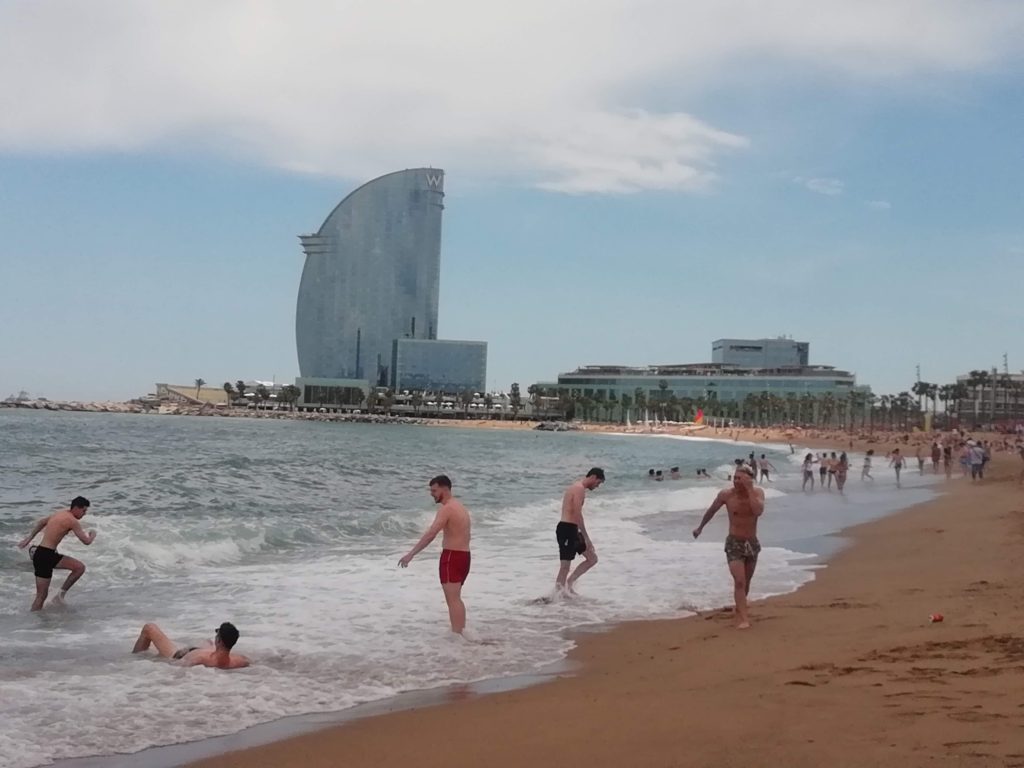
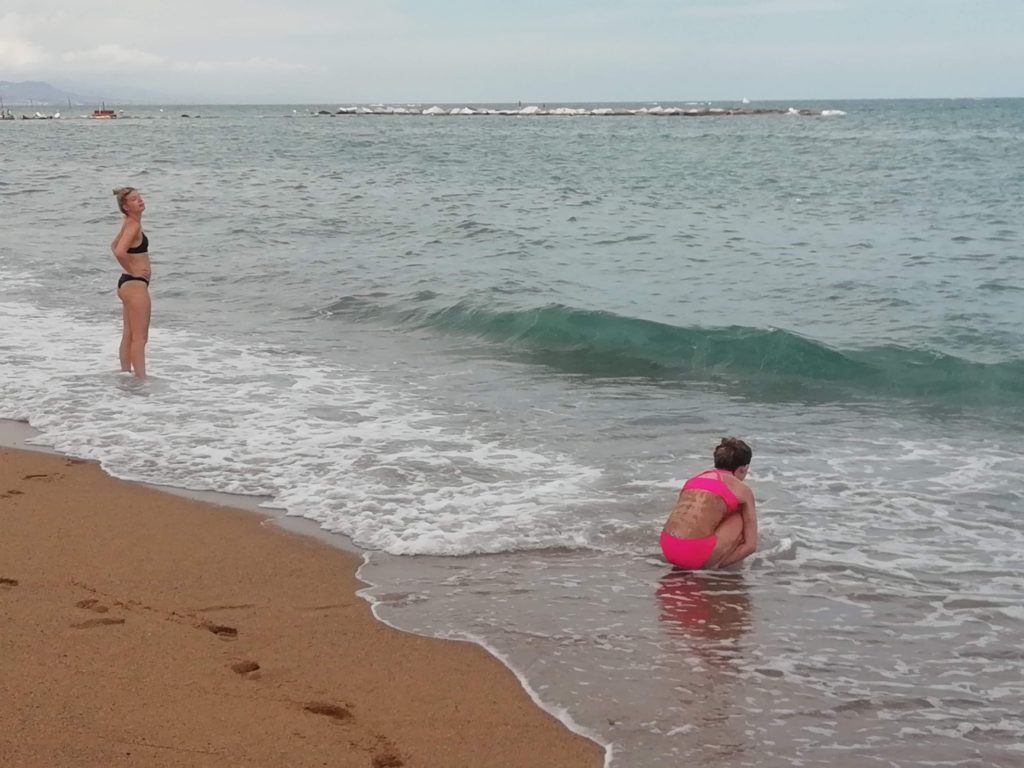
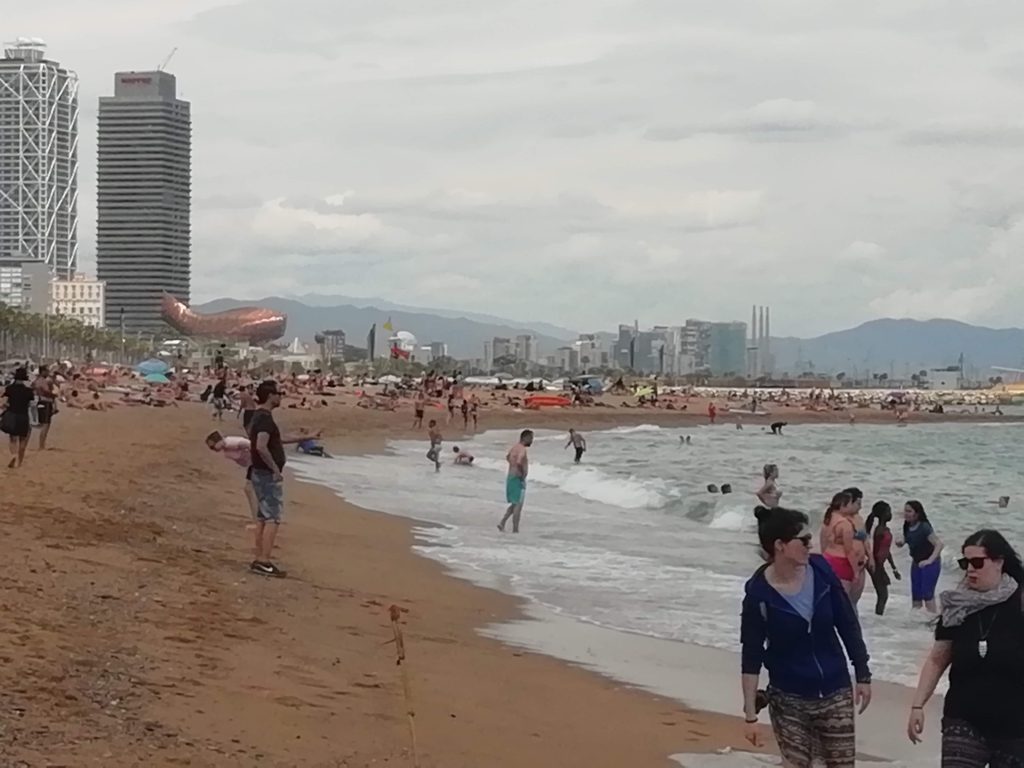
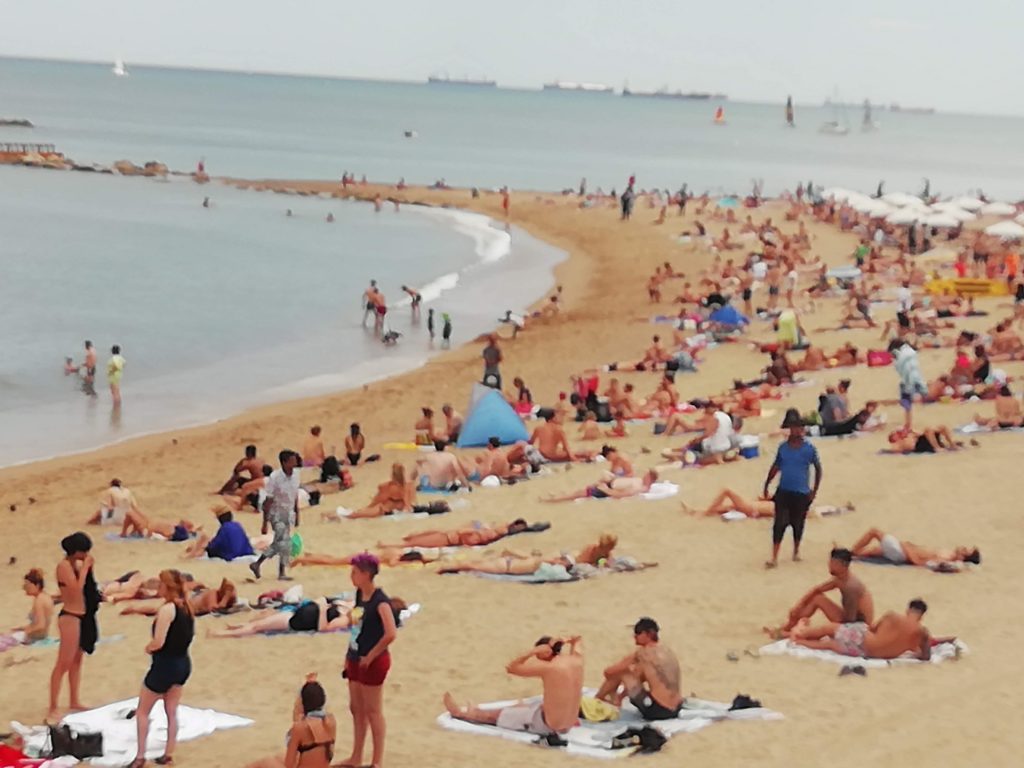 Completely happy and relaxed, we wandered up into the neighborhood for lunch and found a little place in a small plaza next to a schoolyard. As we waited for our grilled salmon plate with roasted vegetables and salad with ficelles, we drank white wine and Estella Damm beer and watched the life of the neighborhood. A Muslim mother in headscarf sat with her twelve-year-old son in the shade, seeming to wait out the lunch hour during one of the final days of Ramadan while children played in the schoolyard on the other side of the wall.
Completely happy and relaxed, we wandered up into the neighborhood for lunch and found a little place in a small plaza next to a schoolyard. As we waited for our grilled salmon plate with roasted vegetables and salad with ficelles, we drank white wine and Estella Damm beer and watched the life of the neighborhood. A Muslim mother in headscarf sat with her twelve-year-old son in the shade, seeming to wait out the lunch hour during one of the final days of Ramadan while children played in the schoolyard on the other side of the wall.
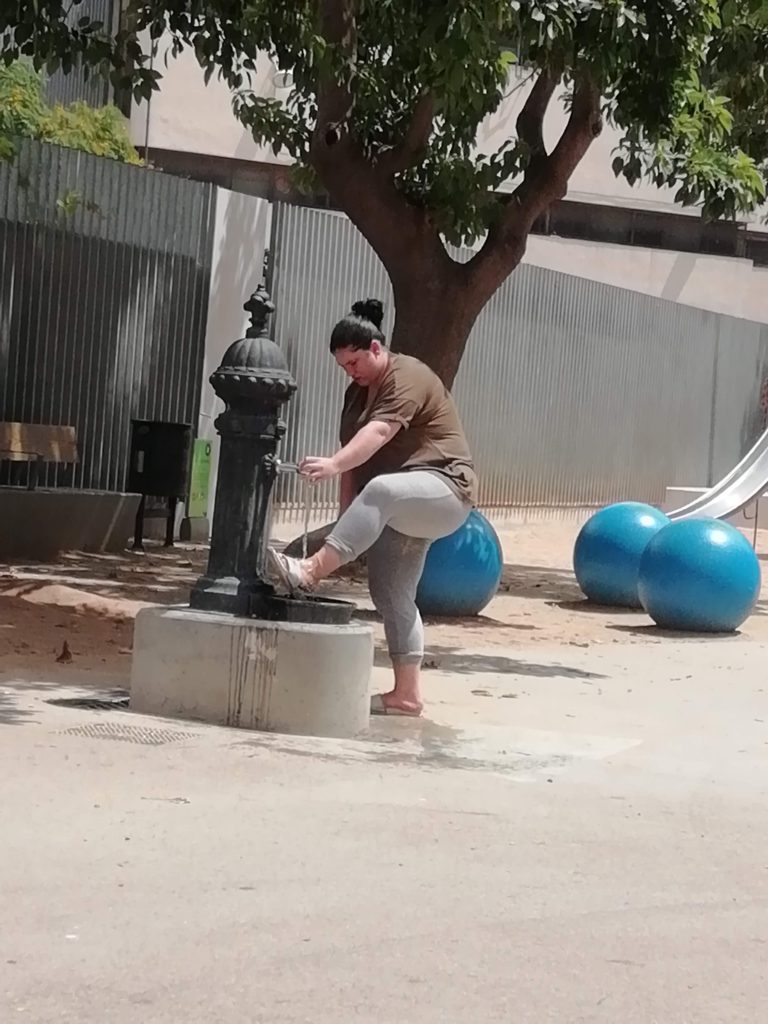
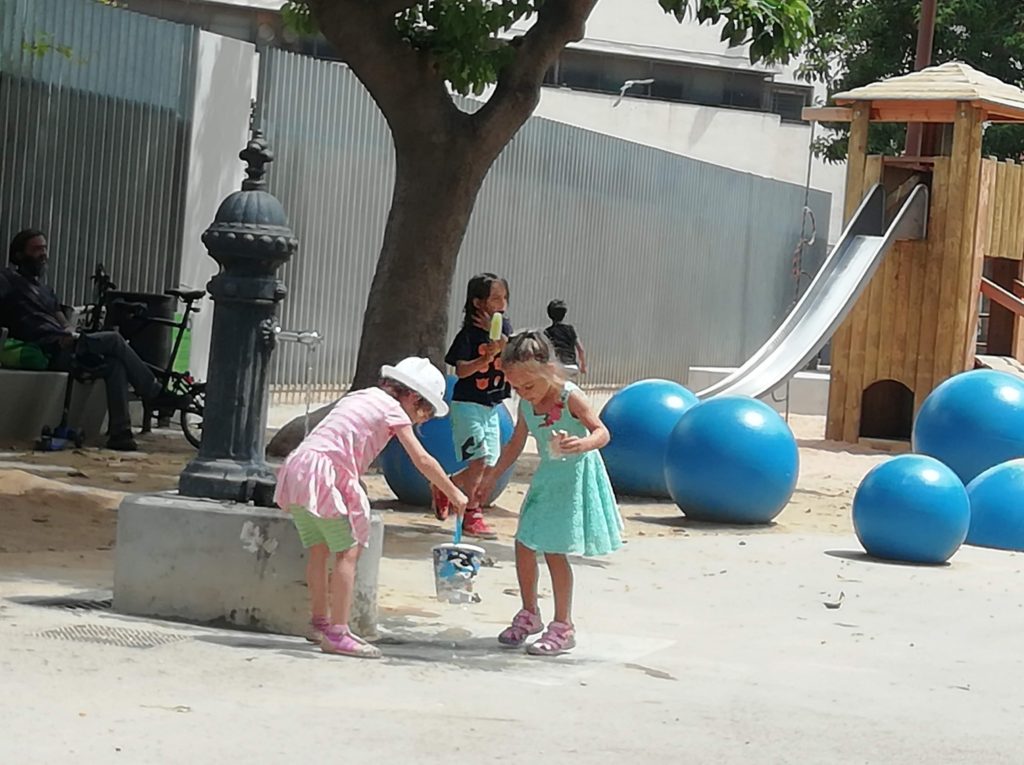
As I watch this calm scene, loud voices suddenly erupt in the small street running alongside the plaza next to the doors of apartment buildings and small shops. A man on a small motorcycle, a woman with long blond hair on the seat behind him, seems to have run into the back of a small white delivery van. The van driver, young, tall and muscular has gotten out and is yelling at the man on the motorcycle, fist raised in the air. The woman has dismounted from the seat on the back of the bike and taken off her helmet, hair cascading down, uncertain what to do. A few men from the shops have come to try to calm the situation, but it continues to escalate, the man on the motorcycle evidently protesting his innocence in louder and louder voice. Since he is smaller than the van driver, the situation seems precarious. Two tall older men physically intervene and seem to suggest to the man that he calm himself, be reasonable and get insurance information from the motorcycle driver.
Walter walks calmly over to the street near them, making a wide circle on the periphery, to see if his assistance might be needed. As he sits there, watching, a man who seems to be an official appears, the situation seems to come to a very uneasy resolution and the van driver gets in and drives around the corner, in front of our restaurant. But he’s only waiting for the man on the motorcycle who foolishly comes around the corner in the same direction. The argument resumes and the men from the neighborhood have to intervene again. The people sitting with us in the cafe have tried to ignore the whole thing but now look in the direction of the dispute which has now moved to a closer stage. They laugh and comment to each other in Catalan. Eventually, both men drive off, perhaps to revenge themselves around some unseen corner.
Our lunch comes after some time on this beautiful day. We eat with relish and walk back towards the Metro station, past the park we love that stretches with its rows of majestic palms from the Arch de Triumphe at one end to the statue and zoological park at the other.
Today we have a long morning in our hostel and then take the 92 bus a few blocks away in the El Clot neighborhood not far from the Sagrada Familia (which we will not go to see this time) to Park Guell, another unfinished monument to Gaudi At the local bus stop, two older women help us figure out that we are in fact, in the right place, despite the lack of a label for the stop. I now can figure out enough of the Catalan speech (closer to French often than Spanish) to get the gist of their conversation, complaining to each other about the lack of information and the errors in the weather forecast for the day.
I watch the city go by through the windows of the bus, the beautiful Cathedral de San Juan unfolding its astonishing architecture in the moments of passing. I won’t be able to explore it this time. Perhaps if we return. We get out with two young Asian men at the stop for Park Guell and cross over the avenue with the rest of the crowd. All around us flows a soup of different languages—French, Spanish, English, Catalan, perhaps Persian–all probably questioning and responding in their isolated attempts to decipher the same system—the system that defends the entry into this famous place. The guards answer the same questions over and over, pointing again and again in the direction of one line or another.
The internal part of the park is the prize since it contains the only completed buildings of this intended community for the elite of Barcelona, started back when the twentieth century was new. Tickets weren’t available till the evening so we decided not to bother and, instead, climbed around the beautiful park outside the community, up the winding paths and stone stairs to the top where we stood, like the many tourists taking selfies, in awe of the view of the whole, enormous, complicated city, capital of Catalonia, stretched out to the blue Mediterranean there before us. There were the mud-dripped spires of Sagrada Familia Cathedral complete with towering cranes and scaffolding and there the “Barcelona Tower” phallically gleaming proudly nearby, there the jumble of apartment buildings, new and old, most with red tiled roofs, the huge old graceful government buildings, the old churches and cathedrals, the streets winding through—the whole diverse complexity of it.
All the way up there on the top of that small mountain was a neighborhood school, the kids noisily playing in the schoolyard perched here high in strange juxtaposition to all these people from foreign places admiring the view.
Barcelona is like this, life going on in every direction, just regular life, seemingly rather joyous life. We wound back down, me buying a bird whistle from one of the immigrant vendors hawking wares for a Euro or two, taking a video of the young Indian singer with sitar, Walter stopping to ask the attendants at the gate to the inner sanctum about the ongoing reconstruction of the arched entryway, and finally finding the source of the loud chattering in the tall palm trees lining the pathways—bright, iridescent green parrots, another exotic variety of life’s forms, fit for this city of mixtures.
Back down we went into the city in the district of Gracia, really a town in itself, a bit quieter in its old streets than other sections of town, but still alive, and on down to the Metro Station to find our way back to our temporary home.
Later in the night, after a rest and some food, I wonder out to get some groceries for the morning and decide to explore the neighborhood in its night dress. Many small restaurants and tavernas are still open, some with tables on the street or the plaza. An old couple walks by holding hands on one of the tiled streets where cars rarely venture. They stop for a moment, the woman turning to the man, looking up into his face and saying something earnestly—I make out only “Claro.” She seems satisfied. He smiles and they walk on. As at any time of the day or night, parents go by with children in strollers or walking alongside, now a bit more subdued than during the day, but still out and about. A young woman goes by on a skateboard, skillfully gliding and turning.
I walk to the little plaza a couple of blocks from the wide Avenida de Meridiana where people still fill the two cafes of outdoor tables and umbrellas. In the middle of the plaza, folding tables are set up and Arabic music plays on loudspeakers. It is the penultimate night of Ramadan and a local group of Muslims has set up an Iftar meal to share with the community.
Women in headscarves, young men and children are serving themselves and passersby from kettles of stew, plates of flatbread and urns of sweet mint tea. Night has truly fallen now and people are beginning slowly to disappear from the square. I stop and wish some of the young women in headscarves a good Eid tomorrow and take some delicious tea from the older man who stands ready to pour. They find one of the women who speaks English to translate my message and they all smile and say thanks. The food is almost gone. Some of the group begin to clean up and load things into a van parked nearby. Others dump the refuse of their evening’s work into the big nearby garbage and recycling receptacles that conceal deep holes underneath, a ubiquitous part of the modern overlay of this old city.
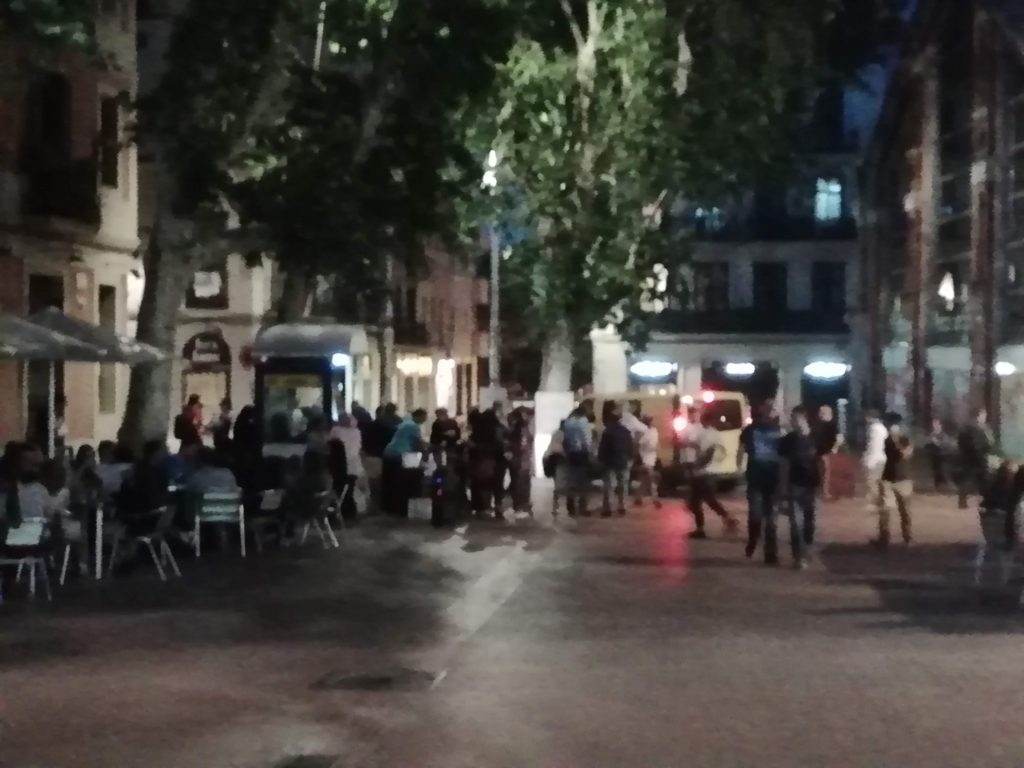
The plaza and the streets leading into it are dotted with benches in small groups, some facing into the street, some into the plaza, all still filled with people out in the cooling night air, talking together animatedly. Friends walk up to join them, some greeting each other with energy, kissing on both cheeks before sitting on a bench opposite to chatter. A gay couple walks by, arm in arm down a quiet part of the street, one carrying a bag of groceries dangling from his free hand. People stand in doorways smoking, some alone and gazing into the distance, some talking with a friend.
Tomorrow morning the real buzzing life of the city will resume. Just before dawn, sometime around five-thirty, the rumble of the metro will resume periodically like muted peals of underground thunder below the endless apartment buildings. Small cars and vans will whiz by on the wide avenues, knowing when to stop for pedestrians crossing at places with no traffic lights. Bikes will speed by with their varieties of riders, women in dresses, sports riders with helmets, young men going from one part of the city to another sweaty and smiling or determined and driven, some tourists on rented bikes. Motorcycles and motor scooters will zoom by in troops, some weaving gracefully in and out of the traffic, driver with one foot out, ready to stop at a moment’s notice. Motorized scooters will whiz smoothly around the turns from avenue into avenue, somehow keeping up with the rest of the traffic. Old women and men on motorized wheelchairs will occasionally drive with confidence ahead of flex buses, seemingly fragile yet somehow protected. Workmen will start their drilling and banging and pouring of concrete with clouds of dust that pedestrians flow around, accustomed to the practice.
And in the morning we will pack again, something we now know how to do now with efficiency, and take the Metro to Barcelona Sants train station to catch the TGV bound for Paris. We will get out at Narbonne, France and transfer to a train to Carcassonne. There we will start the adventure of settling in a new land. I am trying to start thinking in French.

